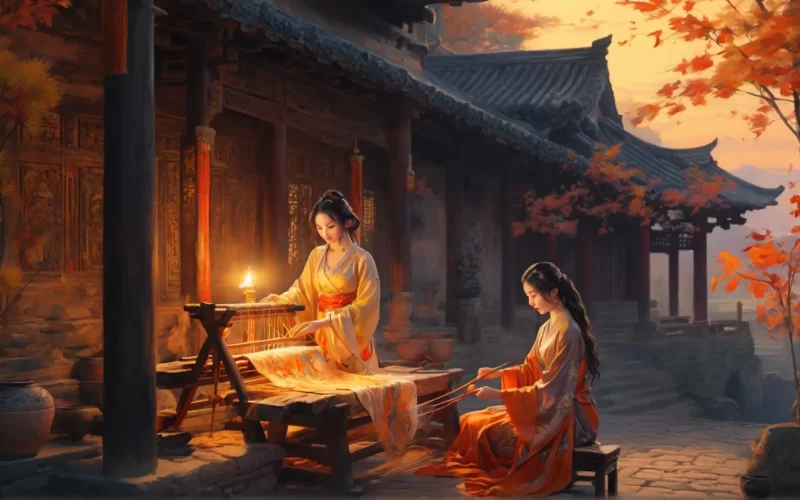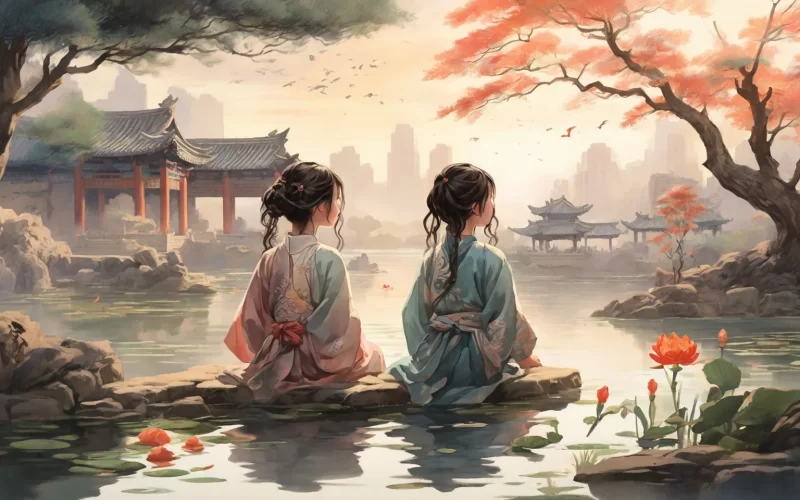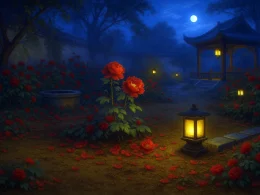A slip of the moon hangs over the capital;
Ten thousand washi ng-mallets are pounding;
And the autumn wind is blowing my heart
For ever and ever toward the Jade Pass...
Oh, when will the Tartar troops be conquered,
And my husband come back from the long campaign!
Original Poem
「子夜吴歌」
李白
长安一片月, 万户捣衣声。
秋风吹不尽, 总是玉关情。
何日平胡虏, 良人罢远征。
Interpretation
The poet establishes setting with "Chang'an" and creates vast, serene moonlit atmosphere through "one moon." "Ten thousand homes pounding" shatters the stillness, the rhythmic beats mirroring wives' restless hearts. The luminous capital appears beautiful yet sorrowful - tranquil scenery overlaying countless families' wartime anxieties.
Second Couplet: "秋风吹不尽,总是玉关情。"
Qiū fēng chuī bù jìn, zǒng shì yù guān qíng.
Autumn winds that never cease, Blow toward Jade Pass with love's increase.
The "autumn wind," symbol of desolation, echoes the women's unrelenting sorrow. Their longing, like the endless wind, focuses on "Jade Pass" - the frontier garrison representing absent husbands. The natural imagery intensifies the emotional depth.
Third Couplet: "何日平胡虏,良人罢远征。"
Hé rì píng hú lǔ, liáng rén bà yuǎn zhēng.
When will northern tribes be undone? So our men may cease to roam!
This direct outcry expresses war-weariness and longing for peace. "When" conveys helpless waiting, while "cease to roam" voices their deepest wish. Beyond personal longing, these lines implicitly protest endless wars that devastate ordinary lives.
Comprehensive Analysis
Progressing from scenery to emotion, the poem moves from moonlit laundry sounds to wind-borne yearnings, culminating in an anti-war plea. While ostensibly portraying military wives' longing, it embodies Li Bai's concern over border conflicts and compassion for suffering civilians. Its concise, natural language and genuine emotion have made it an immortal masterpiece.
Artistic Innovations
- Scenery-Emotion Fusion: The autumn moon, wind and pounding sounds create melancholic beauty that mirrors inner sorrow.
- Layered Emotional Buildup: Beginning with descriptive imagery, developing emotional resonance, then climaxing in direct protest - creating compact yet powerful structure.
- Natural Diction with Profound Implications: Deceptively simple language carries intense feeling and musicality, enhancing its oral transmission.
Insights
More than expressing wifely devotion, the poem reveals war's destruction of family bonds and civilian life. It reminds us that peace is priceless - conflicts shatter not just territories but human hearts. Today, we should cherish stability while honoring those who wait steadfastly through separation. The poem's enduring power lies in transforming domestic scenes into universal meditations on war's human cost.
Poem translator
Kiang Kanghu
About the poet

Li Bai (李白), 701 - 762 A.D., whose ancestral home was in Gansu, was preceded by Li Guang, a general of the Han Dynasty. Tang poetry is one of the brightest constellations in the history of Chinese literature, and one of the brightest stars is Li Bai.











